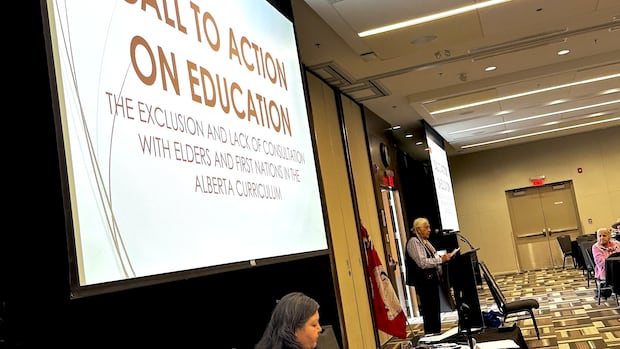Tsuut’ina Nation member Bruce Starlight thinks the knowledge gap between elders like himself and young people is growing, marking a disservice not only to Indigenous, but also non-Indigenous youth in their ability to learn an accurate history of Alberta’s original inhabitants.
The solution? Incorporating more Indigenous knowledge into provincial K-12 curriculum, something Starlight said the government has not effectively achieved in its recent rounds of education revisions.
Those include new math, social studies, physical education and wellness curricula for both elementary and junior high students.
“We’re not going to take this lying down anymore,” said Starlight, who’s been a longtime education advocate for his community.
Starlight said he and other First Nations elders have not been adequately consulted by the Ministry of Education in the development of new elementary and middle school curriculum.
Over the last weekend, Starlight organized a two-day summit at Tsuut’ina Nation that brought together elders, educators and leaders from treaty territories across the province.
The meeting’s goal was to develop a new strategy to address the province over those shortcomings, and develop alternative solutions.
“Nobody’s actually carried the torch to Alberta and said ‘this is what we want,'” said Starlight.
“So what [the summit] is is to push our agenda forward.”
WATCH | Elders say they’ve been excluded from development of new provincial cirriculum:
Elders from Alberta First Nations led a grassroots call to action to find a common strategy to approach the province over what they say is their exclusion from the development of new K-12 curriculum
The province is currently working on a new middle school curriculum for the 2026 fall semester.
In November 2024, it said it was planning to take early drafts of the Grade 7 to Grade 9 math and social studies and Grade 7 to Grade 10 phys-ed and wellness curricula and consult with school board trustees, superintendents, First Nations education directors and “subject matter experts,” according to a government news release at the time.
Education minister Demetrios Nicolaides said in an interview with CBC News that, since then, there has been ongoing consultation with education authorities with different First Nations organizations.
“I’m happy to take that feedback and see how we can use that to strengthen engagement for the next round for the junior high curriculum,” said Nicolaides.
“I did have an opportunity to have several conversations myself personally with education authorities, with different First Nations organizations and others. And department officials also had subsequent conversations. And I know some groups were able to provide some feedback. So if there’s more that we can do, I’m always happy to hear their views.”
He added that certain aspects of the social studies curriculum were adapted to align with that feedback, particularly relating to terminology.
For example, the word ‘stories’ was changed to ‘narratives’ when discussing First Nations histories in K-6 elementary curriculum.
‘It could imply a fictional element to it so that was some of the feedback we received from one of our First Nations partners’, Nicolaides said.
Successive provincial governments have been trying to modernize the curriculum for a decade, a process that has received backlash from Indigenous leaders and elders in the past.
In 2021, Lubicon Lake Chief Billy-Joe Laboucan withdrew his support of K-6 curriculum drafts, citing that he felt like a “token Indian.”
Starlight said Indigenous teachings are too often pigeon-holed into cultural days or arts-based learning at school, and that they should be incorporated more holistically across subjects.
He added that when elders or Indigenous leaders are repeatedly overlooked, it feels like a continuation of colonialism.
“They gotta teach about the residential school, they gotta teach about things that affect us daily … then why is it that they’re developing a curriculum that we’re not involved in?”

David Scott, an associate professor with the Werklund School of Education at the University of Calgary, was invited to take notes at the summit, and plans to compile a report for the group of elders to bring forward to the Ministry of Education.
He said the government has fallen short on its commitment to involve Indigenous leaders in the education system.
“They’ll say that there is inclusion, but I would say it’s tokenistic,” said Scott.
“If we’re really getting serious about thinking about Indigenous knowledge systems and, you know, the real history of this place in this country, that’s absent in the curriculum right now.”
Teena Starlight is an educator with the Tsuut’ina Board of Education and the first member of that nation to earn a doctorate.
She said some areas of the curriculum in particular that could be improved are teachings on how First Nations are governed, and the details and intentions behind treaties.
She added that, in addition to improved curriculum drafts, she hopes that educators, including principals and superintendents, begin to implement the four calls to action pertaining to education by the Truth and Reconciliation Commission more often.
Right now, she said those calls are often adhered to as just another box to check, and are not as meaningfully engaged with as they could be.
“[Schools] should have that living in their day-to-day teachings, not just a subject or when it’s Indigenous People’s Day or Orange Shirt Day.”
#Alberta #Nations #elders #werent #properly #consulted #education #curriculum












Leave a Reply